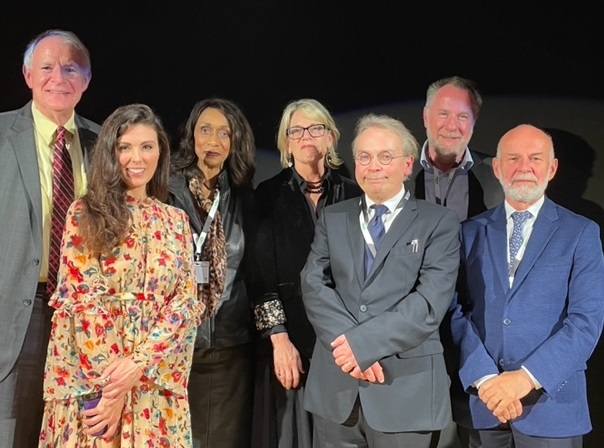 (L-R) US Ambassador Tom Barrett; Lisa Burke; Dr Carolyn Jefferson-Jenkins; Elizabeth Mullenix; Dr Louis Chauvel; Daniel Eischen; Carlo Krieger (Miami University (Ohio) alumnus);
Credit: Helen O'Mahony/Chronicle.lu
(L-R) US Ambassador Tom Barrett; Lisa Burke; Dr Carolyn Jefferson-Jenkins; Elizabeth Mullenix; Dr Louis Chauvel; Daniel Eischen; Carlo Krieger (Miami University (Ohio) alumnus);
Credit: Helen O'Mahony/Chronicle.lu
On the evening of Tuesday 8 October 2024, the Miami University Luxembourg Foundation, supported by the US Embassy in Luxembourg, held its inaugural event on the topic of the 2024 US Presidential Election (5 November).
The event saw guest speaker Dr Carolyn Jefferson-Jenkins, former president of the League of Women Voters of the United States and retired adjunct assistant professor at the University of North Carolina, discuss the topic "Every Vote Counts". This was followed by a panel discussion, moderated by Lisa Burke, and a Q&A session with the audience. The other panellists were Prof Louis Chauvel, Professor of Sociology at the University of Luxembourg, and Daniel Eischen, co-founder of communications consulting agencies in Luxembourg.
The event began with Claude Strasser, Managing Director of POST Luxembourg, welcoming guests to the POST Luxembourg Helix building in Luxembourg-Gare.
This was followed by an address by Elizabeth Mullenix, Provost of Miami University. She recalled that Miami University’s Luxembourg campus (MUDEC) in Differdange was founded in 1968, following the social unrest of the 1960s, with the aim of encouraging international experiences and global understanding for US students. These experiences continue to the present day with current MUDEC students being afforded the opportunity to discuss US democracy with international students and professors.
Guest speaker Dr Carolyn Jefferson-Jenkins acknowledged that "the eyes of the world" are on the US. She began by identifying ten election facts and posed rhetorical questions that encouraged the audience to think of voting history, the importance of voting and what influences and impedes people to vote. She wondered if the US constitution requires change as the country becomes more diversified. Do decisions on where and how to vote affect a free and fair election? Dr Jefferson-Jenkins spoke of the different amendments throughout US history giving different groups the right to vote.
Dr Jefferson-Jenkins continued by discussing young people and the potential influence of social media in their participation in this year’s election. She also questioned why there are not more young people running for office. Other questions speculated if political polarisation was a weakness or a strength. The electoral college system which was initially designed to give smaller states the same voice as larger ones has had an unintended outcome, she noted. Candidates now identify the so-called Swing States and concentrate their attention in these areas. Fifteen states are currently lobbying for a national popular vote to determine the outcome of elections.
Campaign spending was also discussed and if large amounts of money really are necessary to determine the best candidate. Another question raised was the double standard of voters being influenced by race and gender. The subject of what is at stake in the election was also raised - a healthy democracy must confront the issues facing it.
Dr Jefferson-Jenkins continued by quoting Abraham Lincoln, saying: "Democracy equals power". It is "of the people, by the people and for the people". She questioned who these people are: are they those with money, with the voice, those that complain or those who get out and vote?
She concluded by discussing the challenges and the resilience of the election process. The challenges mentioned included the increasing division between political parties, the effect of social media in spreading disinformation and misinformation and the altering of electoral district boundaries for political gains. However, there are strong indicators of resilience which include the ongoing increase in voter turnout and grass roots activism around issues such as healthcare and climate change.
During the panel discussion, Daniel Eischen addressed the topic of the "Potential Impact of AI and dis/misinformation in a digital age". He highlighted how artificial intelligence (AI) can be a very advantageous tool if used in the correct way, but can also be used to negatively influence and manipulate communication. The audience were advised to remain curious and sceptical.
Dr Louis Chauvel discussed "US Elections from a European Perspective". He spoke of the contrast between the many incredible things the US has to offer and the extreme inequalities that also exist. He also mentioned the need for wisdom in decision making, looking at long range goals, and the importance of fortitude and temperance to ensure that emotions are not at the centre of decision making.
The panel discussion continued with Dr Jefferson-Jenkins outlining the obstacles facing the recruitment of poll workers. Various methods of voter suppression were looked at again.
The panellists also spoke of how a campaign is like a marketing act with the voter as the client, and about the role of AI in creating an attractive image and reaching a large audience. Social media's role in influencing voters must be considered: the more one listens and hears something the more likely one believes it to be true.
Questions from the audience included finding the right balance to ensure electoral integrity, the link between democracy and money, as well as potentially needing large funds following the election in case of Supreme Court action. A member of the Luxembourg Youth Parliament wondered if mandatory voting should be considered. Another audience member remarked on how people not from the US are very interested in the election, which tied in nicely with Dr Jefferson-Jenkins opening remark of the eyes of the world being on the US.
US Ambassador to Luxembourg, Tom Barrett, joined in the Q&A. Originally from the swing state Wisconsin, Ambassador Barrett emphasised the importance for candidates to campaign in these swing states. He also stated that Pennsylvania could be critical in the coming Presidential election.
Audience members were invited to a small reception following the presentation.








